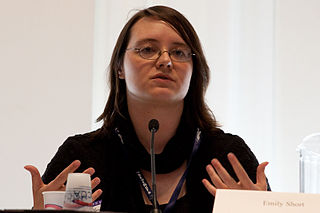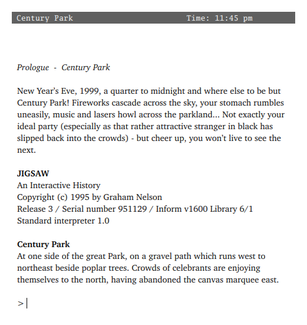Interactive fiction (IF) is software simulating environments in which players use text commands to control characters and influence the environment. Works in this form can be understood as literary narratives, either in the form of Interactive narratives or Interactive narrations. These works can also be understood as a form of video game, either in the form of an adventure game or role-playing game. In common usage, the term refers to text adventures, a type of adventure game where the entire interface can be "text-only", however, graphical text adventure games, where the text is accompanied by graphics still fall under the text adventure category if the main way to interact with the game is by typing text. Some users of the term distinguish between interactive fiction, known as "Puzzle-free", that focuses on narrative, and "text adventures" that focus on puzzles.
Inform is a programming language and design system for interactive fiction originally created in 1993 by Graham Nelson. Inform can generate programs designed for the Z-code or Glulx virtual machines. Versions 1 through 5 were released between 1993 and 1996. Around 1996, Nelson rewrote Inform from first principles to create version 6. Over the following decade, version 6 became reasonably stable and a popular language for writing interactive fiction. In 2006, Nelson released Inform 7, a completely new language based on principles of natural language and a new set of tools based around a book-publishing metaphor.
Text Adventure Development System (TADS) is a prototype-based domain-specific programming language and set of standard libraries for creating interactive fiction (IF) games.

Galatea is an interactive fiction video game by Emily Short featuring a modern rendition of the Greek myth of Galatea, the sculpture of a woman that gained life. It took "Best of Show" in the 2000 IF Art Show and won a XYZZY Award for Best Non-Player Character. The game displays an unusually rich approach to non-player character dialogue and diverts from the typical puzzle-solving in interactive fiction: gameplay consists entirely of interacting with a single character in a single room.

Andrew Plotkin, also known as Zarf, is an American programmer and writer. He is a central figure in the modern interactive fiction (IF) community. Having both written a number of award-winning games and developed a range of new file formats, interpreters, and other utilities for the design, production, and running of IF games, Plotkin is widely recognised for both his creative and his technical contributions to the homebrew IF scene.

Emily Short is an interactive fiction (IF) writer. From 2020 to 2023, she was creative director of Failbetter Games, the studio behind Fallen London and its spinoffs.

ifMUD is a MUD associated with the rec.arts.int-fiction newsgroup accessible via telnet or a MUD client. It is central to the interactive fiction community, frequented by many of the genre's best-known writers. Every year, the XYZZY Awards are hosted on ifMUD during an online ceremony.
Jon Ingold is a British author of interactive fiction and co-founder of inkle, where he co-directed and co-wrote 80 Days, and wrote Heaven's Vault and Overboard!. His interactive fiction has frequently been nominated for XYZZY Awards and has won on multiple occasions, including Best Game, Best Story and Best Setting awards for All Roads in 2001. Ingold's works are notable for their attention to the levels of knowledge that the player and player character have of the in-game situation, with the effect often depending on a player who understands more than the character or vice versa. Ingold has also written a number of plays, short stories and novels.

Anchorhead is a Lovecraftian horror interactive fiction game, originally written and published by Michael S. Gentry in 1998. The game is heavily inspired by the works and writing style of H.P. Lovecraft, particularly the Cthulhu mythos.
Vespers is an interactive fiction game written in 2005 by Jason Devlin that placed first at the 2005 Interactive Fiction Competition. It also won the XYZZY Awards for Best Game, Best NPCs, Best Setting, and Best Writing.

Jigsaw is an interactive fiction (IF) game, written by Graham Nelson in 1995.
Shade is a 2000 interactive fiction video game developed and published by Andrew Plotkin for DOS.

Nick Montfort is a poet and professor of digital media at MIT, where he directs a lab called The Trope Tank. He also holds a part-time position at the University of Bergen where he leads a node on computational narrative systems at the Center for Digital Narrative. Among his publications are seven books of computer-generated literature and six books from the MIT Press, several of which are collaborations. His work also includes digital projects, many of them in the form of short programs. He lives in New York City.
Earth and Sky is an interactive fiction trilogy written and produced by American author Paul O'Brian about the adventures of a brother and sister who gain superpowers while searching for their lost parents. Games in the series have won awards in the annual Interactive Fiction Competition and received an XYZZY Award.
GROW is a series of Flash or HTML5-based puzzle games created by On Nakayama, a Japanese indie game developer, and posted to his website, eyezmaze.com. The series, which was launched on February 7, 2002, comprises 12 full games, 7 minigames, and 1 canceled game. The most recently released title was published in June 2018. The games all feature a simple click-button interface requiring the player to determine the correct combination of buttons to click to maximize visual reward and ultimately to achieve the good ending. Graphically spare and minimalist, GROW games employ a cute aesthetic and often include creatures and characters taken from On's other games like those in the Tontie Series.

Sam Barlow is a British video game designer, best known as the writer and designer of Her Story, the two British Silent Hill games Silent Hill: Origins and Silent Hill: Shattered Memories, Telling Lies and Immortality. He previously worked as a game director at Climax Studios, before leaving in 2014 to become an indie game developer. He published his first independent game, Her Story, in June 2015. In 2017 he founded Half Mermaid, a video game production company based in Brooklyn, New York.

Cryptozookeeper is an interactive fiction game written and self-published by American developer Robb Sherwin in 2011. Cryptozookeeper was written in the cross-platform language Hugo and runs on Windows, Macintosh OS-X, and Linux computers. Cryptozookeeper was released under a Creative Commons license and contains more than 12 hours of game play.
Judith Pintar is a sociologist and author of interactive fiction. As the Director of the Game Studies and Design Program, she teaches game studies, narrative design, and Southeastern European Studies at the University of Illinois, Urbana-Champaign.
With Those We Love Alive is a Twine interactive fiction game written by Porpentine. It was released on October 1, 2014 in both English and Hungarian. The musical score was composed by Brenda Neotenomie.
Counterfeit Monkey is a 2012 interactive fiction espionage game by Emily Short.









